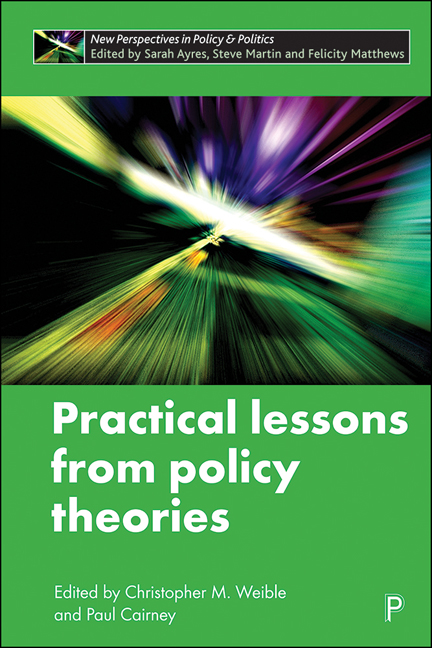Book contents
- Frontmatter
- Contents
- List of figures and tables
- Notes on contributors
- one Purposes and paths in drawing practical lessons from policy theories
- two Three habits of successful policy entrepreneurs
- three Narratives as tools for influencing policy change
- four Using cultural theory to navigate the policy process
- five The lessons of policy learning: types, triggers, hindrances and pathologies
- six Practical prescriptions for governing fragmented governments
- seven Drawing practical lessons from punctuated equilibrium theory
- eight Policy design and the added-value of the institutional analysis development framework
- nine Why advocacy coalitions matter and practical insights about them
- ten Reflections and resolutions in drawing practical lessons from policy theories
- Index
two - Three habits of successful policy entrepreneurs
Published online by Cambridge University Press: 05 January 2022
- Frontmatter
- Contents
- List of figures and tables
- Notes on contributors
- one Purposes and paths in drawing practical lessons from policy theories
- two Three habits of successful policy entrepreneurs
- three Narratives as tools for influencing policy change
- four Using cultural theory to navigate the policy process
- five The lessons of policy learning: types, triggers, hindrances and pathologies
- six Practical prescriptions for governing fragmented governments
- seven Drawing practical lessons from punctuated equilibrium theory
- eight Policy design and the added-value of the institutional analysis development framework
- nine Why advocacy coalitions matter and practical insights about them
- ten Reflections and resolutions in drawing practical lessons from policy theories
- Index
Summary
Introduction:how to improve the multiple streams narrative
The multiple streams approach (MSA) is one of policy scholarship's biggest successes. Kingdon's (1984) study is one the highest cited books in policy studies, there is a thriving programme of empirical application and theoretical refinement, its lessons are applied regularly in interdisciplinary studies, and it is relatively well known and enjoyed by practitioners and students (Herweg et al, 2015; 2017; Zahariadis, 2007; 2014; Jones et al, 2016).
Yet, its success is built on shaky foundations because its alleged strength – its flexible metaphor of streams and windows of opportunity – is actually its weakness. Most scholars describe MSA superficially, fail to articulate the meaning of its metaphor, do not engage with state of the art developments, and struggle to apply its concepts systematically to empirical research (Jones et al, 2016). These limitations create an acute scientific problem: most scholars apply MSA without connecting it to a coherent research agenda. Consequently, it is difficult to produce new knowledge systematically or describe with confidence the accumulated wisdom of MSA. As the special issue on ‘Practical lessons from policy theories’ shows, this problem is a feature of many policy theories which have expanded far beyond their original intentions (Weible and Cairney, 2018).
There have been some recent attempts to solve this problem by encouraging conceptual clarity via hypothesis production and testing (Cairney and Jones, 2016; Cairney and Zahariadis, 2016; Herweg et al, 2015). However, this solution only appeals to a niche audience of MSA scholars. Most readers and users of MSA draw on Kingdon's (1984) classic metaphor without taking their research to the next level by engaging with over 30 years of subsequent research and theoretical refinement. Kingdon's study of US federal politics in the 1980s can only take us so far. Therefore, we need a more profound solution that draws the attention of all MSA users to state of the art research, its applications, refinements and contemporary implications. Its success will provide benefits to everyone, from the expert scholar to the new student. I solve this problem in three ways. First, I turn lessons from individual studies and systematic and qualitative reviews of the literature into a coherent MSA narrative. If successful, this narrative will become the primary reference point for policy scholars seeking to conduct new empirical research and explain MSA to new audiences such as students, practitioners and scholars from other disciplines.
- Type
- Chapter
- Information
- Practical Lessons from Policy Theories , pp. 13 - 34Publisher: Bristol University PressPrint publication year: 2021

